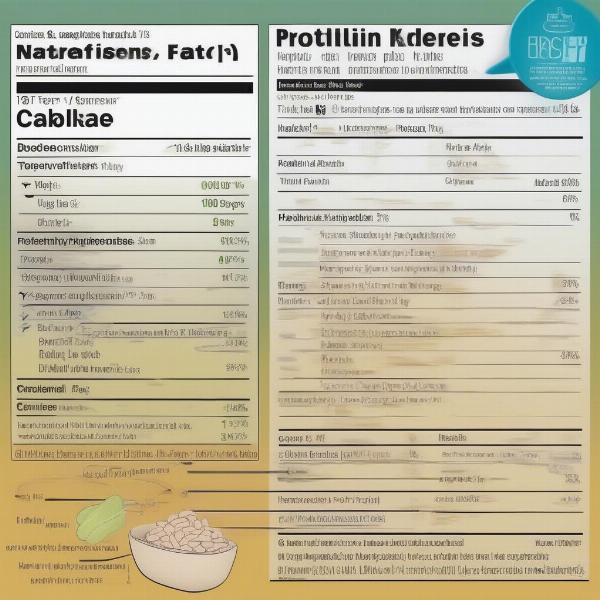Choosing the right food for your small breed dog can feel overwhelming, especially with so many options available. Finding a “blue” small breed dog food might add another layer of complexity. While “blue” could refer to a brand name or the color of the kibble itself, this article will focus on providing essential information about selecting the best nutrition for your small companion, regardless of color. We’ll cover key aspects of small breed dog nutrition, including ingredient selection, understanding labels, and addressing specific dietary needs.
Understanding Small Breed Nutritional Needs
Small breed dogs have unique nutritional requirements due to their higher metabolism and smaller stomachs. They require a diet that is energy-dense, packed with essential nutrients in smaller portions. This means choosing a food with high-quality protein sources, healthy fats, and digestible carbohydrates. Look for foods specifically formulated for small breeds, as the kibble size will be more appropriate for their tiny mouths.
Deciphering Dog Food Labels
 Close-up of a dog food label with highlighted ingredients
Close-up of a dog food label with highlighted ingredients
Understanding dog food labels is crucial for making informed decisions. The ingredient list is ordered by weight, so the first few ingredients represent the bulk of the food. Look for named meat sources (e.g., chicken, beef, lamb) as the primary ingredients, rather than generic terms like “meat by-products.” Avoid fillers like corn, wheat, and soy, which offer little nutritional value.
What to Look For:
- High-Quality Protein: Essential for muscle development and overall health.
- Healthy Fats: Provide energy and support skin and coat health.
- Digestible Carbohydrates: Offer sustained energy and fiber for digestive health.
- Vitamins and Minerals: Crucial for various bodily functions.
Addressing Specific Dietary Needs
Just like humans, small dogs can have allergies or sensitivities. Common allergens include chicken, beef, and grains. If your dog experiences digestive upset, skin issues, or excessive itching, consider switching to a limited ingredient diet or a hypoallergenic formula. Consult your veterinarian for guidance on identifying and managing food allergies.
Common Allergies:
- Chicken: While a good protein source, some dogs are allergic.
- Beef: Another common protein allergen.
- Grains: Wheat, corn, and soy can trigger sensitivities.
Choosing the Right Kibble Size and Texture
Small breeds often struggle with larger kibble sizes. Opt for a food specifically designed for small breeds, which will have smaller, easier-to-chew pieces. Consider your dog’s individual preferences, as some prefer crunchy kibble, while others might do better with softer textures.
Expert Insights on Small Breed Nutrition
Dr. Emily Carter, DVM, a renowned veterinary nutritionist, emphasizes the importance of tailored nutrition for small breeds: “Their faster metabolism and smaller digestive systems necessitate a diet that is nutrient-dense and easily digestible. Choosing a high-quality, small breed-specific formula can significantly impact their overall health and longevity.”
Furthermore, Dr. Carter advises against free-feeding small dogs due to their tendency to overeat: “Scheduled mealtimes help regulate their intake and prevent obesity, a common issue in small breeds.”
Conclusion
Choosing the right “blue small breed dog food” may seem daunting, but focusing on nutritional value, ingredient quality, and your dog’s individual needs simplifies the process. Remember to consult your veterinarian for personalized dietary recommendations, especially if your dog has any health concerns. Providing optimal nutrition is a key component of ensuring a long, healthy, and happy life for your small companion.
FAQ
- How much should I feed my small breed dog? Follow the feeding guidelines on the dog food label, but adjust based on your dog’s activity level and body condition.
- What are some signs of food allergies in dogs? Itching, skin redness, digestive upset, and ear infections can be indicators of food allergies.
- Is it okay to give my small dog treats? Yes, but choose healthy, low-calorie treats and factor them into your dog’s daily caloric intake.
- How often should I switch my dog’s food? If your dog is thriving on their current food, there’s no need to switch frequently. If you do switch, do it gradually to avoid digestive upset.
- What’s the difference between adult and senior small breed dog food? Senior formulas often have lower calorie content and added joint support ingredients.
- Can I feed my small breed puppy adult dog food? No, puppies require specialized puppy food formulated for their growth and development.
- Are grain-free diets always better for small breeds? Not necessarily. Some dogs thrive on grain-free diets, while others may benefit from including grains. Consult your vet.
Related Articles on ILM Dog
ILM Dog, a leading international pet website, provides reliable information and advice on all aspects of dog care, from breed selection and health to training and nutrition. We offer expert guidance to help you provide the best possible care for your canine companion. Whether you’re a new dog owner or a seasoned expert, ILM Dog is your trusted resource. Contact us at [email protected] or +44 20-3965-8624 for more information.